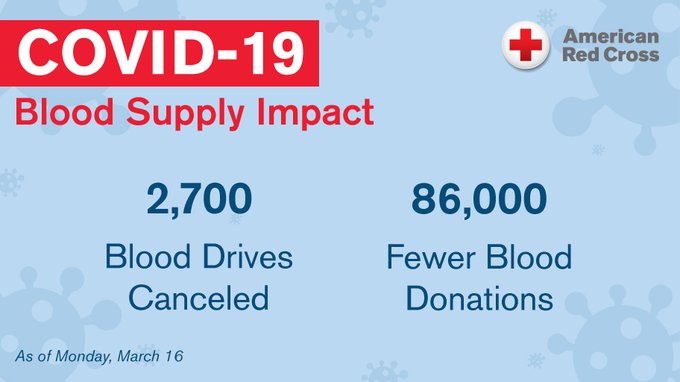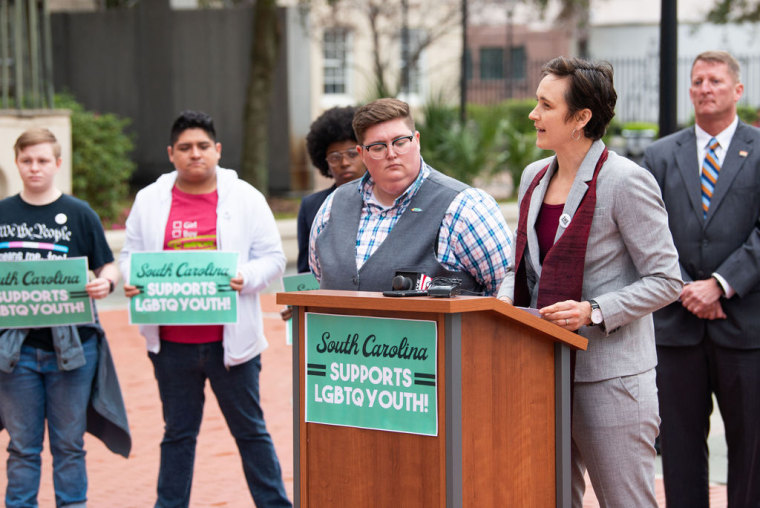There Shouldn’t Be a Ban on Gay Blood Donors—Especially Now
Another crisis, another urgent call for blood donors, and another probably futile call on the Food and Drug Administration to fully lift the ban on gay men giving blood.
Since the coronavirus crisis began, 2,700 blood drives have been cancelled and there have been 86,000 fewer blood donations as of March 16, the American Red Cross reports.

We now face a severe blood shortage due to an unprecedented number of blood drive cancellations during this #coronavirus outbreak. Make an appointment to help patients counting on lifesaving blood: https://rdcrss.org/2weMYZI

1,5758:53 AM – Mar 17, 2020Twitter Ads info and privacy2,081 people are talking about this
Gay men were, until 2015, forbidden from donating blood. This “lifetime ban” dated back to all those having gay sex from 1977 onwards. In 2015, the FDA said it was OK for men who have sex with men to donate blood, but not if they were sexually active. Only those who had abstained from sex for a year could give blood.
“Ultimately, the 12-month deferral window is supported by the best available scientific evidence, at this point in time, relevant to the U.S. population,” Dr. Peter Marks, deputy director of the FDA’s biologics division, said at the time, according to Reuters.
“It is ridiculous and counter to the public health that a married gay man in a monogamous relationship can’t give blood, but a promiscuous straight man who has had hundreds of opposite sex partners in the last year can,” said Jared Polis, then a Democratic congressman and co-chair of the Congressional LGBT Equality Caucus, and now the governor of Colorado (making him the nation’s first out-gay man elected as governor).
Polis was right; like so many things about the discrimination LGBTQ people face it is often the sheer absurdity of the discrimination that is most offensive. Everything—from the blood ban to discrimination in the workplace, to “religious freedom” being used to chip away at rights and freedoms—comes down to a fierce disgust of LGBTQ people; the sex they have, or the biology they possess. That disgust is then translated into discriminatory law-making.
According to a recent study, there has been no significant increase in HIV infections from blood transfusions in the US since the FDA’s 2015 rule change.
The gay blood ban came into place in 1983, in the fledgling days of AIDS. It said everything about the priorities of the Reagan administration that it was so quick to exclude gay men from donating blood, and so utterly negligent when it came to caring for them as they died in their many thousands.
The blood ban set the tone for that administration’s callous disregard when it came to AIDS care, treatment, and prevention. It was LGBTQ activists and allies who forced the Government to act; and even then gay people and people with HIV were relentlessly stigmatized and demonized. The continued blood ban, and its ridiculous 12-month celibacy clause, is a shameful hangover from that.
To suggest that only gay men who have not had sex for as year are “clean” enough to give blood is homophobic.
As GLAAD reported in 2018, “The FDA screens every unit of blood donated for infectious diseases prior to entering the donation pool. Current tests for HIV are able to detect the presence of the virus with high precision within 11 days after infection.
“Based on this science, a 12-month deferral for MSM does not make any sense; furthermore, the test is able to detect HIV with such a high precision that only 1 in 3.1 million units of blood infected with HIV will make it past the screen. Therefore, opening up blood donations to MSM donors would not cause a significant difference in HIV transmission risk from blood transfusions.”
RELATED IN U.S. NEWS
When Comparing Coronavirus & AIDS, Credit These LGBTQ HeroesThey Made History as The World’s First Official Gay PartnersHarvey Weinstein Is in for a Rude Awakening at Rikers
How is a gay man’s sexual behavior effectively patrolled, and deduced by the FDA? Truth serum? Lie detector? The presentation of clean underwear that can be carbon-dated?
What would stop any man simply lying about who they sleep with to give blood? What stops a promiscuous straight guy from lying? How would the FDA know? One of the curious ironies of the FDA’s policy is that it relies on a gay man’s honesty to perpetuate the discrimination the FDA is executing against him. We have to do the right thing, so the FDA can do the wrong thing to us.
If the FDA’s blood ban is based on an assumption of gay promiscuity, it follows that it automatically assumes that straight men do not sleep around; and that their heterosexuality does not need to be patrolled or pre-judged. Please, FDA, share with us how you know so much about each individual blood donor’s sexual behavior with no prior knowledge, without asking them anything, and without testing their blood?
Enlighten us: What is it about sexually active, heterosexual blood donors that automatically—no knowledge required—makes them preferable over a gay man whose sexual behavior you have no clue about?
GLAAD notes that while it may be true that “MSM blood donors have a higher risk of contaminating blood supplies due to disproportionately high rates of HIV as compared to other groups in the U.S…the MSM population is not homogenous.”
The blood ban, as it extends to each individual person wanting to donate, is simply predicated on assumptions and stereotypes; and as GLAAD says, on stigma rather than science. What does the FDA mysteriously know about gay and straight people, and how and when and with whom they have sex, before they’ve even filled in the requisite forms?
The real message of the gay blood ban, and it is a message echoed in prejudice and prejudicial laws aimed at LGBTQ people, is that gay sex is bad; and that the sex a gay person has is all that they are, and all you need to know about them to discriminate against them.
It also presumes an incredibly narrow definition of what “gay sex” might involve. What if you are a gay man who does not have penetrative sex, but nevertheless considers the sex you are having to be sex? What if you have penetrative sex, and that sex is safe?“The issue isn’t the amount of sex gay men have or the kind of sex they are having, but the questions the FDA asks of all donors, gay and straight”
“Too bad. Go away,” the FDA says, knowing gay men’s bodies and minds before they have even spoken to them. “We don’t want your blood.”
The FDA wants men who have sex with men to renounce having sex; then they’re OK. It doesn’t want men having sex with women to do this. Or women having sex with men. Everything about the ban places straight sex on some kind of purer pedestal than gay sex.
Surely, the issue isn’t the amount of sex gay men have or the kind of sex they are having, but the questions the FDA asks of all donors, gay and straight, about the sex they’re having and with who they’re having it.
In 2015, when the ban was partially lifted—with that all-important 12-month celibacy clause—gay men were told they were kind of good enough to be blood donors, but kind of not.
If the FDA really wants gay blood, it should be on the same basis that it accepts heterosexual blood. Make giving blood equal for all. Make everyone go through the necessary hoops to ensure the blood supply is safe.
Until then, the “gay blood ban” remains in place—and no patronizing pat on every virginal gay man’s head changes that.










